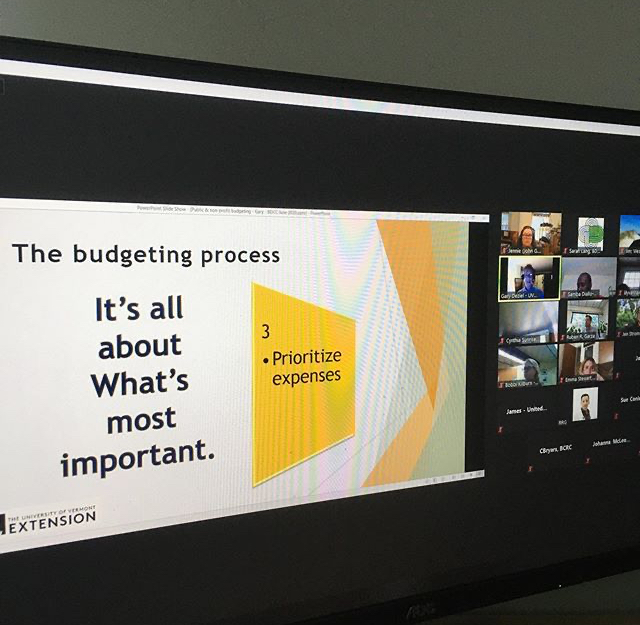
Budgeting Basics and Pro Tips Provided at SVEP Financial Management Training
On June 25 and 26, BDCC’s Southern Vermont Economy Project (SVEP) hosted a Financial Management for Projects Training, the second training in a four-part Project Development Series. SVEP is a USDA-backed capacity-building program to help southern Vermont’s local community and economic development organizations get more projects done successfully. Despite disruptions of in-person events due to COVID-19, SVEP committed to continue trainings as planned using virtual platforms. The training took place over two days to counteract “Zoom fatigue” for participants.
Working with towns and community-based organizations over the past three years, SVEP manager Sarah Lang had identified the need for help with financial management basics among local boards, volunteers, and staff. Lang spent several months putting together the Project Development Series, looking at what was available locally. “I wanted something that both provided budgeting basics, but also a deep dive into different types of budgeting. We also needed a constructive conversation around how to effectively piece together different funding streams for projects.” Since nothing like this was available for a low or no cost to attendees, Lang set out to create a unique training to address the needs of the communities SVEP serves.
Reaching out across the statewide community and economic development network, Lang was introduced to Gary Deziel, an Assistant Professor at UVM Extension. After their first conversation, she knew he would be a perfect fit. Deziel’s work focuses on public libraries, which can be non-profits or municipalities. He advises libraries on budgeting as well as human resource management, and workforce development. As Associate Dean of Finance and Operations, UVM Extension, Deziel has experience in budgeting and budget management, grants and contracts, fund accounting, gifts, endowments, cash management, petty cash, and sales and fees. For the SVEP training, Deziel put together a custom curriculum with an introduction to budgeting and budget management based off of a “Tour de Budget” he teaches to library staff and board members across Vermont.
On day two of the training Bobbi Kilburn, Director of Finance and Grant Management at BDCC took a deep dive into capital, business, project, and program budgeting, showing real life examples and actual budgets. Kilburn is known for her budgeting and grant management work through the technical assistance she provides to many municipalities, organizations, and businesses in the Windham Region based on her role at BDCC and as a member of the Windham Regional Commission.
The final segment of the training convened a panel of experts to talk about “Getting More Money,” the ins and outs and the importance of having multiple different types of funding streams and what those funding streams entail. Guilford’s Richard Wizansky, a Principal in BoldMoves Consulting, unpacked fundraising strategies from feasibility studies to donor stewardship. Jim Matteau of Westminster talked about finding new revenue when the original endowment fell short of what was needed to sustain the Westminster East Parish and the historic Institute. Lisa Ryan from the Preservation Trust of Vermont gave an overview of the ways in which they help communities develop strategies for any downtown or village project, not just historic structures. Kevin Wiberg from the Vermont Community Foundation emphasized the importance of developing strong communication and a relationship with funders. Abbey Salomon, a Loan Officer at Community Capital of Vermont, shared how they provide not only lending and lines of credit to non-profits, but also critical financial technical assistance to help projects succeed. Rounding out the panel, Jon-Michael Muise from USDA Rural Development shared some of the ways that USDA and his programs can provide funding, technical assistance, but also project development advice and support along the way. Muise told the group of participants, “This is one of the best trainings that I’ve ever been present for!”
A recording of the training, as well as the presentations and contact information for the presenters, can be found on the Past SVEP Programming and Resources Page. SVEP trainings will continue to be held virtually until in-person events can safely resume. Keep an eye out for more about the events that are a part of the 2020 SVEP Project Development Series or email Sarah Lang, SVEP Manager, at slang@brattleborodevelopment.com.
About the Southern Vermont Economy Project
The Brattleboro Development Credit Corporation’s Southern Vermont Economy Project provides training and technical assistance to increase local capacity, skills, and resources in order to advance local projects critical to Southern Vermont achieving community, economic, and workforce development goals. In its second round of funding by the USDA Rural Community Development Initiative, SVEP 2.0 partners include; the Towns of Rockingham, Brattleboro and Bennington; the Windham Regional Commission; Southeastern Vermont Economic Development Strategies; Bennington County Regional Commission; Bennington County Industrial Corporation; Readsboro Hometown Redevelopment Inc.; and Bellows Falls Area Development Corporation. For more information please visit: https://brattleborodevelopment.com/svep/



